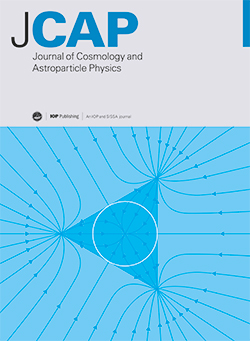中微子振荡作为引力波探测器?
IF 5.3
2区 物理与天体物理
Q1 ASTRONOMY & ASTROPHYSICS
Journal of Cosmology and Astroparticle Physics
Pub Date : 2025-05-22
DOI:10.1088/1475-7516/2025/05/075
引用次数: 0
摘要
引力波可以改变中微子的传播距离,从而影响中微子的振荡。这可能导致与其他中微子退相干源竞争的振荡行为完全消失。我们制定了一套标准,以确定在何种条件下中微子振荡对这种效应敏感。我们发现当前或不久将来的中微子振荡实验对相干GW信号和随机引力波背景都不够敏感。本文章由计算机程序翻译,如有差异,请以英文原文为准。
Neutrino oscillations as a gravitational wave detector?
Gravitational waves (GWs) can alter the neutrino propagation distance and thus affect neutrino oscillations. This can result in a complete disappearance of the oscillatory behavior that competes with other sources of neutrino decoherence. We develop a set of criteria that determines under which conditions neutrino oscillations are sensitive to this effect. We find that current or near future neutrino oscillation experiments are neither sufficiently sensitive to coherent GW signals nor to the stochastic gravitational wave background.
求助全文
通过发布文献求助,成功后即可免费获取论文全文。
去求助
来源期刊

Journal of Cosmology and Astroparticle Physics
地学天文-天文与天体物理
CiteScore
10.20
自引率
23.40%
发文量
632
审稿时长
1 months
期刊介绍:
Journal of Cosmology and Astroparticle Physics (JCAP) encompasses theoretical, observational and experimental areas as well as computation and simulation. The journal covers the latest developments in the theory of all fundamental interactions and their cosmological implications (e.g. M-theory and cosmology, brane cosmology). JCAP''s coverage also includes topics such as formation, dynamics and clustering of galaxies, pre-galactic star formation, x-ray astronomy, radio astronomy, gravitational lensing, active galactic nuclei, intergalactic and interstellar matter.
 求助内容:
求助内容: 应助结果提醒方式:
应助结果提醒方式:


